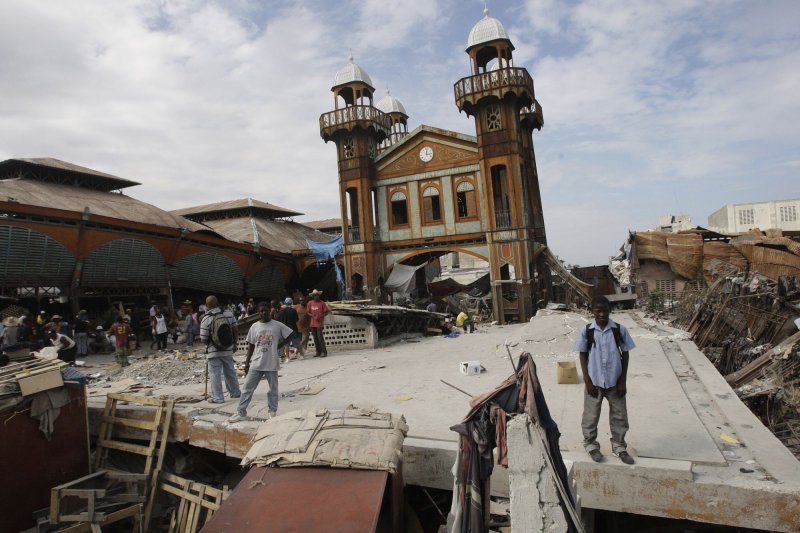1 of 2 | People stand on the remains of a market in Port-au-Prince, Haiti on January 19, 2010, after a 7.0 magnitude earthquake caused severe damage on January 12. UPI/Anatoli Zhdanov |
License Photo
PORT-AU-PRINCE, Haiti, June 1 (UPI) -- The scope of the devastation from the January 2010 earthquake in Haiti was not as severe as once estimated, a draft of a U.S. government report indicates.
The report, which hasn't been released publicly, comes as the new Haitian government tries to collect the $4.6 billion pledged by international donors and as the 2011 hurricane season begins, The New York Times reported Tuesday.
The draft said up to 895,000 people moved into camps after the earthquake, not the 1.5 million estimated by the International Organization for Migration. The report also said an estimated 375,000 people were displaced with a maximum of 66,620 living in camps, which contradicts the IOM's estimate that more than 600,000 people lived in camps.
The report also said amount of rubble that must be cleared was overstated.
However, the U.S. Agency for International Development, which commissioned the report, pulled back from the report's most controversial finding -- a lower death toll. The report estimated between 46,000 to 85,000 people died in the quake, well below the Haitian government's estimate earlier this year that 316,000 had been killed. In the first weeks after the earthquake, the government said about 230,000 had died.
Carleene Dei, a USAID director, said in a statement, "[Any] comment on the death toll of the tragic earthquake of January 2010 that affected so many, is beyond the scope of the commission and purely reflects the views of the author."
Dei said the U.S. government "remains steadfast in our support of Haiti and its people today, tomorrow and for the long-term," The Miami Herald reported.
The report said it reached its estimates by "sampling one part of the Port-au-Prince population.
"It stretches the credibility to suggest that there are less than 100,000 [internally displaced persons] in camps when we physically counted 680,000 in March," Leonard Doyle, an IOM spokesman in Haiti, told the Herald.
The Office for the Coordination of Humanitarian Affairs in Haiti also questioned the report's methodology, saying it excluded "a vast majority of people."















